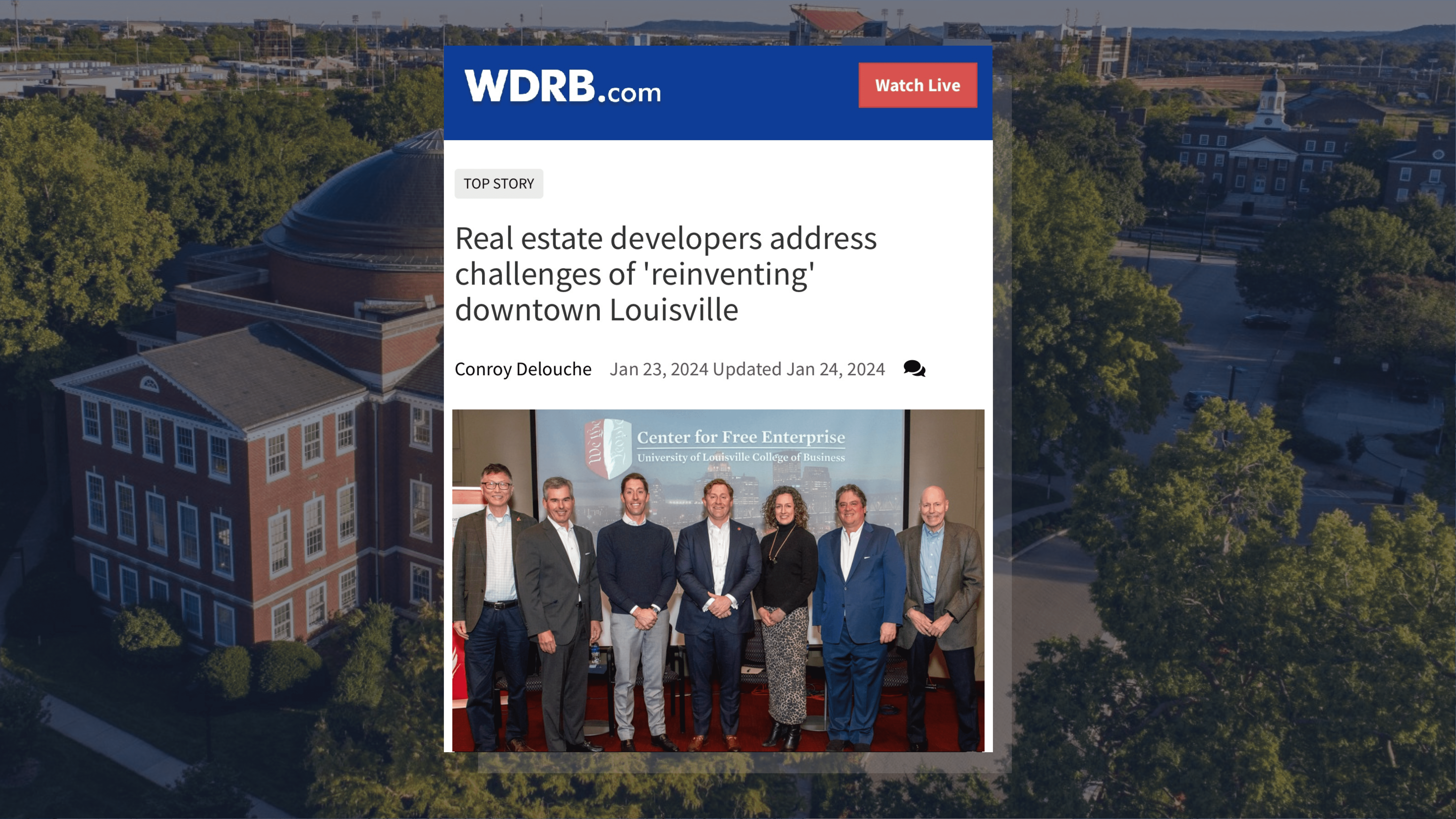
Real estate developers address challenges of 'reinventing' downtown Louisville
This article was written by Conroy Delouche and originally appeared in WDRB on January 24, 2024.
LOUISVILLE, Ky. (WDRB) — Negative perceptions, crime and tall, vacant buildings are all issues that continue to stall downtown Louisville’s post-pandemic rebound.
There are thousands of visitors for conventions, games, concerts and bourbon every month. But the absence of the office worker is still felt.
The University of Louisville’s College of Business hosted a panel of commercial real estate developers Tuesday to discuss “Reinventing Downtown Louisville” as part of the Menard Family Lecture Series at the university. The panelists included Chris Dischinger from LDG Development, Mariah Gratz with Weyland Ventures, Colin Underhill of Pluris Real Estate and the moderator, David Hardy with CBRE.
“Gee, I wish Humana would bring all their workers back downtown,” Dischinger said.
That’s just one small answer to the complex problem of revitalizing Louisville’s downtown. Underhill lamented that in the 2010s, there was a lot of momentum for the district until COVID-19 hit.
“We were getting really close, and now, we’re facing this tough time,” Underhill said.
One recent city initiative is devoting funds to target new office tenants. Underhill said that’s a start, but it is not enough.
“We have 2 million square feet in vacant unleased space in the CBD now,” Underhill said. “One-hundred-thousand square feet is going to eat up the $3 million right there.”
There’s also the issue of public safety. The latest incident was a shooting near Fourth Street Live! over the weekend.
“You run that story on the news and set back another year just to get the east end customer to come downtown for dinner,” Hardy said.
As for solutions, the panel of developers call for more historic tax credits and to allow opportunities for local companies to invest with dollars and ideas.
“We’ve been looking at multiple in the downtown market. Whether it’s taking office building to hotel. Whether it’s taking office buildings to residential, converting some of the office buildings to retail on the lower floors,” Underhill said.
The panel looked to other cities with vibrant music scenes, saying Louisville needs to be more venue-friendly. Underhill mentioned that U of L is a great downtown partner, and a winning men’s basketball team would go a long way.
Business owners close to the KFC Yum! Center have said the fans staying away from the arena is hurting their bottom line.
“When you get out of the habit of coming downtown, you stop coming downtown altogether,” Underhill said.
But the developers said there is also plenty of potential with a signature industry.
“What people want are unique experiences,” Dischinger said. “What’s more unique than bourbon?”
Gratz pointed out that you’ll see more people on a Main Street sidewalk on a Saturday morning lined up outside a distillery than a typical weekday lunch hour.
That 9-5 absence is why Parlay Sports Bar owners started opening their downtown restaurant later in the day.
“As far as lunch goes and things of that nature, there’s just not too many people around downtown right now,” co-owner Chris Hayes said.
Hayes said the business is continuing to grow. Parlay is open every day, and the kitchen is open until past midnight during the week.
“We’re that local bar that if you’re getting off work in the industry. We’ve still got food for you,” Hayes said. “We’ve got drinks. We’ve got TV’s.”
The panel of developers also pointed to the audience of business students as the future of the real estate business, and for the city.
Jeff Guan, the interim dean of the U of L College of Business, said the school just launched a commercial real estate minor to help address the potential future shortage for that industry. He said the university is devoted to the downtown area and is looking at ways to bring a population boost through developments, such as LOUMED, or bringing more residents.
“We are also talking about getting our students to stay downtown, graduate students, so they can get to work without having to drive,” Guan said.
The next discussion of the series at the College of Business will be held Feb. 13 and will focus on investing in communities.
